After the lack of focus I’d had studying for M208, I was adamant that with MST210 I’d get into a routine and stay on top of the work regardless of what else life through at me. This worked pretty well in October and November. I did the work during my commutes, approximately 3-4 hours a day, even if I had to sit on the floor of a train carriage or find a dusty corner of Paddington while waiting for a delayed train. All was going well. At the end of November I began the process of changing jobs and, because of the nature of my work, was put on garden leave for three months. Suddenly I wasn’t confined on trains for about one seventh of every weekday. This is where my whole routine broke down. Continue reading MST210 – Lack of routine has consequences
Tag: Maths
Diagrams with LaTeX – easier than you might think
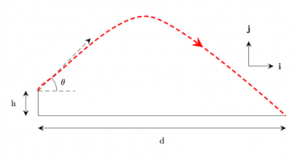
I’ve written before about the power of literate programming, using to create reports when code runs. It’s fairly simple to combine this with the graphical drawing packages to create impressive graphs and figures on the fly. A lot of academics I’ve spoken to have shied away from using
for drawing, despite being very proficient with the textual layout. Similarly, a lot of students on the OU Mathematics degree write up all of their assignments in
but drop in hand drawn graphs and diagrams. Just like anything else in
, once you get your head around how it works, it’s actually not that difficult to create very complex structures. Continue reading Diagrams with LaTeX – easier than you might think
Using OneNote for Open University TMAs

I get a lot of attention when using my surface for note taking at work, studying on the tube or train and during OU tutorials, making full use of multiple notebooks, tabs and pages in OneNote. I’ve written before about using the surface but following a discussion after my most recent tutorial I realised I hadn’t covered the way I use it along side the OU’s electronic TMA submission process1. A lot of people on the same maths course as I am tend to use and typeset their marked assignments. While I am a great fan of
and appreciate how clear this is for the tutors to mark, I have always preferred to hand write assignments. While there is some aspect of writing by hand helping to cement ideas more than those typewritten, the main reason I prefer to handwrite is that the exam is handwritten. If I don’t force myself into regular, neat mathematical writing then it’s easy to make mistakes in the time pressure of the exam. Simple things like forgetting to underline vector or matrix definitions can cost marks and if the examiner can’t distinguish a 0 from a 6 then you’re going to be in trouble! Continue reading Using OneNote for Open University TMAs
MST210 Study focus and time management

If you’ve been reading my blog for a while you’ll know that I start off with good intentions for my OU modules and then finding myself rushing TMAs, skipping a lot of the text and generally revising the day before the exam. While I’ve got away with this so far, it is getting harder to get the scores I want and I knew going into MST210 that my focus and time management would need to improve to take this seriously.
One of the things I took into account when doing this module was the amount of time I spend commuting. Working in London I have a train journey of between 30 mins and 1 hour 15 (depending on whether I travel in rush hour or not) and a tube journey of 27 minutes (fortunately on a single line) in each direction, so at a minimum I have 2 hours on public transport in four good half hour blocks. That’s 10 hours study time a week, which should be sufficient1.
I’m getting a head start on MST210 as with previous modules I’ve fallen behind due to work commitments and I don’t want to impact my family time playing catch up as I did last year. I’ve done one full week and completed book A unit 1. This is on par with the pace that the study calendar sets2 and I have made notes on all the examples and done every single exercise in the unit.
Keeping focus has been really hard. It’s really easy when you’re on a train at 6.30am to sip coffee and stare out of the window as you wake up gradually. It’s so easy when you get on a train or tube and have to stand to just leave my surface and book in my rucksac and play Peak on my phone. It takes no effort after a day at work to grab a gin and tonic and read my Kindle. What is hard is having that focus and discipline to make every minute count – every minute I spend geting ahead now is a minute I can spend having fun with my family rather than having to isolate myself to rush that TMA. It seems like a no-brainer, but humans do tend to make short-term decisions at the expense of long-term success . One of the best things we can do to overcome how our brains work is have a routine and stick to it3.
This is what I’ve been doing – every morning and evening, I’ve forced myself to get my MST210 books out, not only when I’m actually on the train/tube, but also while waiting for them – I keep them in my hands while changing trains; if I don’t put them away, then there isn’t the effort to get them out again. If I need to sit on the floor of a train so I can write, then that’s what I do. This focus has taken a lot of effort and I’m not sure how long it will be before it’s automatic, nor indeed what will happen when my routine changes due to business travel.
However, backed by the science that our brains are dumb enough to make bad short term decisions even if we are aware of the long term consequences, I know that the focus I need is entirely in my own control and if I stick to the routine long enough, it will become the go-to task for my selfish limbic system.
MST210 – mathematical modelling – registered
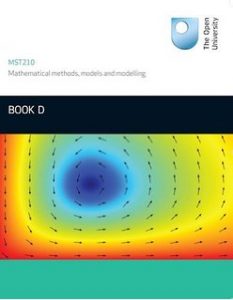
Today, after a lot of pondering I finally signed up for MST210 to start in October. This is the second 60 point module and, just like M208, is mandatory on the BSc Maths pathway. I’d been holding back for a number of reasons and reviewing my post from last year, I realised that nothing had changed. If anything my job is now more mathematically demanding as I dig deeper into the bleeding edge internals of machine learning. My 3D printer is nearly finished and my daily commute is now 3 hours a day, giving me 2 hours a day sitting on trains. That time is currently occupied with getting through a ridiculous amount of books1. What I really want to avoid with MST210 is some of the rushing that I did for M208 – I want to enjoy this module. Continue reading MST210 – mathematical modelling – registered
M208 – revising in 2 days
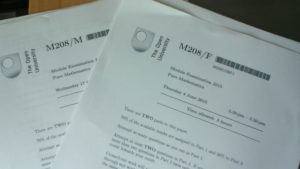
Last week I took the exam for the level 2 Open University module M208 (Pure Mathematics). Just like last year with MS221, I’d not studied as much as I wanted, and had given myself two clear days before the exam to “cram” as much as possible and hope for the best. I want to make it very clear that this is a really poor strategy for any student wanting to revise and please with you not to copy this method! Continue reading M208 – revising in 2 days
Studying by train
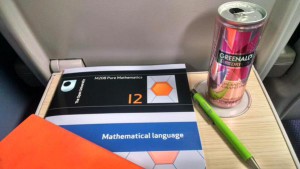
The new OU term started on the 3rd October, but I’ve been working on M208 for four weeks now (although am yet to really do much other than skim through the introduction for DB123). I had a grand plan of confining my studies to the time I spent commuting by train and tutorials as I knew that I would have very little time outside of these short windows to dedicate. So how have the past 4 weeks gone? Continue reading Studying by train
Getting ready for M208 and DB123

It’s that time of the year again. Twitter is full of people posting images of all their books for new OU modules with excitement ahead of the October starts. I was no exception with M208 and DB123 both on the cards for this year.
This year means the start of level 2 modules with M208 Pure Mathematics, which is a 60 point module (the equivalent of a half a normal university year) but also the 30 point DB123 Personal Finance as I had to complete level 1 in parallel if I was to start level 2 this year1. So, in addition to a full time job at a start up company2 I am also doing the equivalent of 3/4 full time on a university course. Continue reading Getting ready for M208 and DB123
Studying Maths – decisions on level 2
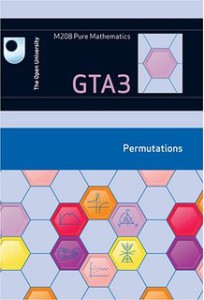
At the weekend I signed up for my next maths modules with the Open University. I’ve got three distinctions in the level 1 modules and, aside from my severe annoyance with being forced to do a level 1 module I’m not interested in as “punishment” for skipping the easy start module1, I was desperate to do the next module. However, I dragged my heels this time. Continue reading Studying Maths – decisions on level 2
MS221 – was Illidan right?
So, a few days ago I tweeted that I had this snippet from World of Warcraft going round my head where Illidan taunted that we weren’t prepared for what awaited us. It was how I felt going into MS2211 and now that I’ve done the exam I wanted to reflect on why I’d ended up feeling unprepared for a test in a subject I am very enthusiastic about for a degree I’m doing for no direct gain other than for the fun of learning.
I started this degree back in 2013 because I was intellectually unstimulated in my job. I was busy, spinning many plates and wasn’t bored, but there just wasn’t anything to do that really set my neurons firing. I’d started the process of looking for another job for a whole host of reasons I won’t go into, but I could feel my brain getting “comfortable” at not having to think much beyond which of my team needed to do which task in what order in response to changing priorities. So I signed up to do the maths degree I’d always wished I’d done. Continue reading MS221 – was Illidan right?